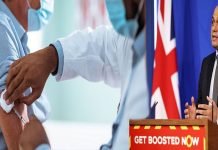The death toll in the U.K. now stands at 50,413, second only to the U.S, the UK is the sick man of Europe
On Friday 27 March 2020, statisticians at Imperial College London said their new best guess for the UK deaths was 5,700 – compared with 28,000 in Italy and around 46,000 in Spain.
Mr. Powis, the medical director at NHS England, said “UK coronavirus death toll under 20,000 would be ‘good result’
But Mr. Powis goes on to say even under 20,000 would only be achieved if people “really lock down and hone down on what we have been asked to do”.
“I cannot emphasise enough. You have the chance to save a life, you have the chance to stop a ventilator being used that otherwise would need to be used. It really is as simple as that,” he said.
Here we are today with 50,000 deaths and its not just bad luck.
The question is what figure do we put on failure and who is responsible?
The government were slow at coming into lockdown with a catalogue of failures
Epidemiologists and former public health officials say the U.K.’s strategy for combating COVID-19 was muddled—leading to delays in purchasing essential equipment and tests, mixed messages about public health practices, and a lag behind its neighbours in implementing social distancing and other restrictions. That likely allowed the virus to spread fast and undetected.
Britain’s first mistake came around the time when the coronavirus was first confirmed in England, on Jan. 31. Prime Minister Boris Johnson chose not to chair a meeting of the government’s emergency COBRA committee, leaving his health secretary Matt Hancock to do so instead. “Because Johnson didn’t chair the meeting at the beginning of February, the government missed the opportunity to see that they needed to be ready to do lots of testing, that they would need to sort out stocks for personal protection and for oxygen and other supplies,”
Johnson’s government made a string of controversial decisions in mid-March. The first came on March 12, the day after the WHO declared COVID-19 a pandemic, when public health officials announced the U.K. would cease tracing and testing the contacts of coronavirus patients — effectively accepting that a full-scale outbreak was inevitable in the country. The U.K. was moving to the next phase of its plan, the “delay” phase, where the imperative was to “flatten the curve,” Johnson announced at a press conference. “We need to squash this sombrero,” he told a packed room of journalists and officials at his 10 Downing Street residence in London. “The decision to stop community testing, I think, was against WHO advice, which is that you need to test, test, test, and push back hard to suppress the virus,” says Ward.
Despite Johnson announcing that Britain’s new focus was to “delay” the spread of the disease on March 12, it took four more days before he formally advised the public to begin socially distancing on March 16. In the meantime, at a press conference, his chief medical adviser mentioned the government’s long-term goal was for Britain to develop “some kind of herd immunity” against the disease, or in other words, letting a large percentage of the healthy population catch COVID-19 in order to prevent it from spreading to the most vulnerable. It was never official policy, but coming when it did, at a time of a policy vacuum, it sent a confusing message, epidemiologists said. “I think that was an error,” says Smeeth, the London School of Hygiene and Tropical Medicine professor. “Briefly, the government made it sound as if they were embracing the idea of herd immunity as a tool to control the epidemic, which I don’t think it was ever intended to be.”
That message changed swiftly on March 16, three days later, when a new scientific study by modelers at Imperial and the London School of Hygiene and Tropical Medicine arrived at Downing Street. It showed that the impact of the disease could be far worse than previously thought. If the government did nothing, 510,000 people would die, it predicted. If the government continued on its current course, the study said, the death toll would still swell to 250,000.
Later that same day, Johnson pivoted. People should work from home if they could, he said in an address to the nation, and “avoid” public venues like pubs and restaurants. His government did not, however, make these measures legally binding, nor did it explicitly tell businesses to close their doors. It would be a whole week until it did. (By comparison, Italy went into lockdown on March 9, Spain on March 14, and France on March 16.) On March 23, Johnson finally appeared on television to announce the country would go into lockdown the next day, with all non-essential travel banned and most businesses being forced to close.
“That week, between the 16th and 23rd when there was no formal lockdown, was the week when we could have gained time in a more aggressive lockdown,” says Ward, the epidemiologist from Imperial College London. Johnson’s long-held conservative belief in personal freedoms, says Ashton, had obstructed a public health imperative. “It was left to individuals to choose whether they went to the pub or not until it got really bad,” Ashton says. “Eventually the government had to make those decisions, but reluctantly.”
The UK should have a national day of mourning.
There is a catalogue of mistakes the result is 50,000 UK citizens dead. That 50,000 represent real people, mums, dads aunties, uncles sons, daughters and grandparents.
More than 50,000 people in the UK have now died after contracting coronavirus, according to the respective national statistics offices of England and Wales, Scotland and Northern Ireland. At least 50,413 people had died, as of late May, with Covid-19 listed on their death certificate, according to England and Wales’ Office for National Statistics (ONS), the National Records of Scotland, and the Northern Ireland Statistics and Research Agency.
The ONS said 45,748 had died with the virus in England and Wales as of May 29. A further 3,911 died in Scotland as of May 31, and 754 passed away with the virus in Northern Ireland as of May 29.
The Office for National Statistics reported that COVID-19 was mentioned on 1,822 death certificates during the week ending May 29, the lowest number of virus deaths in eight weeks. Northwest England recorded the highest number of virus deaths during that time period with 282. In Wales, COVID-19-related deaths accounted for 17.9% of deaths, with a toll of 105.
Scotland’s statistical body reported 131 deaths during the week ending May 31, a decline of 99 from the previous week, and the fifth weekly decrease in a row. While COVID-19-related deaths accounted for 12% of all deaths reported during that time, the percentage has dropped since its peak of 36% in late April.
Northern Ireland reported 49 COVID-19-related deaths in the week ending May 29.
Globally, health officials report more than 7.1 million cases of COVID-19 and more than 407,000 deaths. The U.S. leads the world with more than 1.96 million cases.
None of these figures read well, with fears of a second wave the government must take on board lessons learned from other country’s acting more dismissively and ramping up track and trace to isolate the virus and those infected without realizing we have been in contact.
Support Independent Journalism Today
Our unwavering dedication is to provide you with unbiased news, diverse perspectives, and insightful opinions. We're on a mission to ensure that those in positions of power are held accountable for their actions, but we can't do it alone. Labour Heartlands is primarily funded by me, Paul Knaggs, and by the generous contributions of readers like you. Your donations keep us going and help us uphold the principles of independent journalism. Join us in our quest for truth, transparency, and accountability – donate today and be a part of our mission!
Like everyone else, we're facing challenges, and we need your help to stay online and continue providing crucial journalism. Every contribution, no matter how small, goes a long way in helping us thrive. By becoming one of our donors, you become a vital part of our mission to uncover the truth and uphold the values of democracy.
While we maintain our independence from political affiliations, we stand united against corruption, injustice, and the erosion of free speech, truth, and democracy. We believe in the power of accurate information in a democracy, and we consider facts non-negotiable.
Your support, no matter the amount, can make a significant impact. Together, we can make a difference and continue our journey toward a more informed and just society.
Thank you for supporting Labour Heartlands












